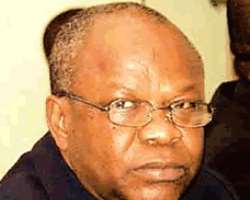THOUGHTS ON IWU'S HAND-OVER NOTE

There was a mild media spin recently over the handover note submitted by the immediate past INEC Chairman, Professor Maurice Iwu to the incumbent, Professor Attahiru Jega. The 109-page handover note was said to have been submitted with three other supporting documents: a cover note, a bound copy of the report of the National Conference for Stakeholders in Nigeria and the UNDP Nigeria 2010 voter registration review period.
The report was said to contain the former INEC chairman's impressions on the polity, the highs and lows of the 2007 election, the roadmap of the commission's preparation for the next election and recommendations he considered apposite for the general improvement in the conduct of subsequent elections. I stand to be corrected but I guess this is the first time in our recent electoral history that an outgoing chairman would be handing over to an incumbent a stewardship note of such volume.
This is not limited to INEC. It is a general disease that has afflicted and still afflicts stewardship in Nigeria especially in the public sector. In most cases, a successor is left in the dark as to what transpired in the office he is occupying because his predecessor did not deem it necessary to compile a comprehensive handover note that ought to serve as a compass for the new occupant of the office. The reason is not difficult to hazard. It is due to the low intellectual content of our leaders and their obvious inability to subject their stewardship to cognitive scrutiny. I commend Iwu for subjecting himself and his leadership to such scrutiny and in-depth disquisition on their stewardship.
However, I wish to suggest that a document of such essence need not grace the tables of INEC officials only. Such document ought to grace the shelves of research institutions, political science libraries of our universities and in fact the hands of those Nigerians who still attach some value to scholarship and learning.
The reason Nigeria has tottered in her quest for development is that after the demise of nationalists like the great and highly cerebral Dr Nnamdi Azikiwe, the nation drifted into the hands of barely literate megalomaniacs who lacked both the content of character to lead and the intellectual capacity to serve as the rallying ideologues. This absence of intellectual panache in leadership explains the continual disconnect between the old and the new order.
Nigerians readily cite the American democracy as a reference for good governance and quality leadership but they fail to inquire into why America has remained a great nation right from the Independence era of George Washington who was president from 1789 - 1797. From Washington through John Adams to Barack Obama, each president has mandatorily left behind a corpus of policies, both failed and successful, for his successor. Whereas it was not compulsory that then successor must stick to the same policy thrust of the predecessor, this practice has helped all American presidents to thread carefully and avoid the pitfalls that encumbered their predecessors.
The same practice has permeated all facets of American life including the private sector.
But this is what we don't see in Nigeria 's public life. A minister is removed from office. He walks away leaving the permanent secretary to prepare a handover note for the next minister. In most cases, the permanent secretary scribbles a few lines that do not capture the dynamics of the ministry's operation; what was done right and otherwise. Thus when the new minister resumes, he is in the dark. The handover note does not provide him any detail of the triumphs and mistakes of his predecessor. In such instance, the minister stumbles over the same stone that brought his predecessor to ruins.
It is in this context that the comprehensive Iwu handover note should be applauded for its insightfulness and in-depth exploration into the dynamics of the 2007 election and efforts being taken to correct the loopholes arising from it. No nation or institution can ever make progress without carefully documenting its history. It is the event of yesterday that we call history today but we often forget that it is the same event of yesterday that shapes events of today and those of today tomorrow's.
The handover note documents our collective electoral event of yesterday which if conscientiously studied, critiqued and applied would shape our tomorrow's electoral event. For finding the courage to chronicle a handover note of such volume in a nation where scant attention is given to the rigours of knowledge and research, Iwu has again demonstrated that the intellectual bent he brought into the nation's electoral process is not a fluke. But the more important thing is for such document to be made available to the larger Nigerian publics.
•Ekanem writes from Abuja
